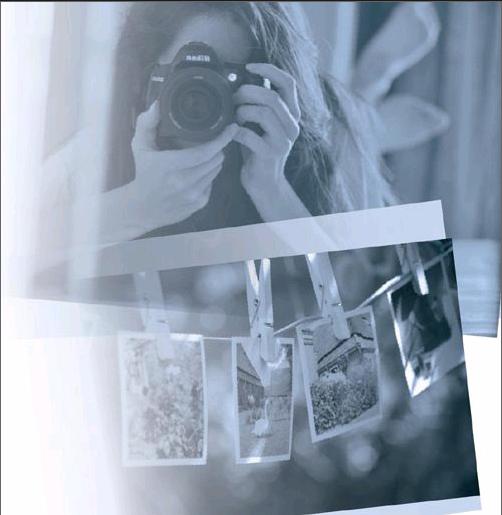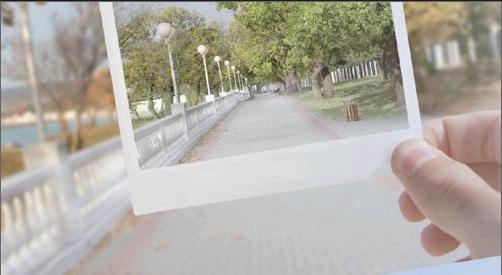I Lost a Decade of Photographs
2014-12-24


I remember my grandmother used to keep all her family photographs in a box by the front door so that if there was a house fire she could save them. The cat could fend for itself1) but, in the days before digital cameras and hard drives, if you lost a photograph, it was gone forever.
As a member of Generation Y2), I thought that I was immune to this worry, until two months ago when I accidentally deleted every digital photograph I had ever taken. This included all photographic evidence of my university days, my backpacking adventures, and every family gathering during my 20s. It also included every photograph Id taken of my husband, Eoghan, who died from cancer three weeks after our wedding.
I have no one else to blame but myself. In September 2013, my relationship broke down and my ex-partner and I agreed that he would get “custody” of our shared laptop. As all my files were stored on the computer, I arranged for him to transfer more than 2,600 photographs on to an external hard drive.
In retrospect, when I collected the hard drive, I should have checked to make sure all of my photographs were on there but instead I saw a folder marked “Amys pics” and made an incorrect assumption.
I only realised my error 12 months later, when I wanted to show my new boyfriend evidence that Id been a Goth3) at university. I plugged in the hard drive, clicked on the folder … and it was empty.
I spent the next two hours in a state of denial, checking and rechecking every folder on my computer, Dropbox4) and iCloud5) with no luck. My grandmothers worst fear had happened to me and every photo in my archive was the equivalent of ash.
The only pictures I have left are those taken before my 21st birthday, mostly out of focus6) and taken with a series of cheap disposable cameras. Apart from that, every snapshot taken between the ages of 21 and 29 is now a distant memory.
The first thing I did was share my grief on Facebook, changing my status to, “That feeling when you delete every photograph youve ever taken # bad day.” My update hit a nerve with every friend from my age group and I was inundated7) with platitudes8). As a generation weve been groomed to believe that no event is valid unless there is evidence it took place.
A number of friends suggested that I put a shout-out on social media asking anyone with photographs of me to email them, but this wouldnt help me. It wasnt the loss of public events such as birthday parties and baby showers that hurt so greatly. It was the intimate, private moments that I was really mourning—the moments that seemed so magical and so unbelievable that I didnt trust my memory of them.
A whole church congregation9) had photos of me saying my vows at the altar but that wasnt the extraordinary point of my wedding day in my eyes. Only I had been there to capture the moment my husband awoke the next morning and, despite being riddled10) with cancer, turned to me and whispered, “I cant believe how lucky I am.”
That was seven years ago and, though I rarely ever looked at those photographs, I always knew they were there as a reminder. Yet, to my surprise, I didnt cry when I realised I would no longer have these memory prompts at my disposal. In fact, as the weeks went on, I felt an odd sense of relief and lightness.
When a song on the radio reminded me of Eoghan, I was no longer tempted to spend an indulgent afternoon poring over old photos. When I was having a fat day, I couldnt look back at photos of my 21-year-old self in a bikini and wish I still had the constitution11) of a child.
I began to wonder if my mistake could actually be a good thing. In our culture of constant self-curation, its tempting to look back on photographs taken on our best day, showing only our best sides and find our life lacking. Could our need to capture every milestone stop us from living in the moment and ever feeling content?
“A permanent record of our lives can imprison us in unrealistic and hurtful feelings about ourselves, our bodies and our relationships,” warns Marie-Pierre Cleret, a psychologist who specialises in narcissistic behavioural disorders. “Such photos, which are often carefully framed, styled and filtered, can make us see our past through a skewed12) lens.”
When it comes to grief, many self-help books recommend making a memory box filled with reminders of your lost love, but there is an argument that such a shrine could be detrimental for some people.
“One of the most powerful processes of grief or disappointment is the fact that our memories fade with time but digital evidence can keep us frozen in a period,” says Cleret. “That series of pictures taken on a wonderful holiday can become weapons in the hands of our inner critic. We can glorify who we were, who others were and the glamorous life we led.”
In her book Necessary Losses, Judith Viorst13) argues that we need to accept that there are losses in life that we need to undergo and embrace in order to be fulfilled, whether its a first love who wasnt suitable, the body a mother had before giving birth or the party life we enjoyed before responsibilities. I can relate to14) this after my experience.
I have always been very conscious of not placing my late-husband on a pedestal15), but sometimes my subconscious still idolises him. I even painted a rose-tinted16) view of our relationship in this article without meaning to, when I wrote about our wedding day. I didnt mention the huge argument we had because I caught him smoking a cigarette at the reception. If the professional photographer noticed us feuding in the corner he certainly didnt capture the conflict, but maybe it should be acknowledged.
It may not be a picture-perfect moment, but its all part of the cartoon strip that made up our love story.
It has been two months since I realised my photos were missing and Ive not only accepted my loss but I can see there are benefits to no longer having a shrine to my 20s. Thats not to say that Im anti-camera, as Ive already amassed17) more than 600 new photographs, but Ive also downloaded an app called X-pire that erases all social media photos after a set expiry date.
I do worry that, when Im older and—hopefully—have children, Ill wish I could show them pictures of me when I was younger, but maybe its better that I cant step into a time machine. In the days before digital cameras, photographs naturally aged, faded, and wrinkled in parallel with the person who took them. Thats the natural order of things.
我记得祖母过去总是将她和家人拍的所有照片都放在前门旁边的一个盒子里,这样万一房子失火,她还可以保全它们。猫遇到火灾可以自己逃生,但在数码相机和硬盘问世之前,照片要是丢了,那就永远找不回来了。
作为Y一代的一员,我曾认为自己不必为此担心,直到两个月前,我意外地删掉了自己拍过的每一张数码照片。这包括我的大学时代、我的背包探险经历以及我在20多岁时参加的每一次家庭聚会的所有照片,它们是我当时生活的见证。这其中还包括我为丈夫奥恩拍的所有照片。他在我们婚礼后三个星期就因癌症去世了。
这件事除了自己我不能责怪任何人。2013年9月,我的恋情告一段落。我和前男友达成一致:由他来“保管”我们共用的笔记本电脑。由于我所有的文件都存在那台电脑里,我就让他把2600多张照片都拷贝到一个外置硬盘中。
现在回想起来,我在拿回硬盘的时候本该检查一下,确保自己所有的照片都在里面,但是我没有。我看到了一个名为“艾米的照片”的文件夹,然后做了个错误的假设。
直到12个月以后我才意识到自己的错误。当时我想给新男友看一些照片,证明自己在大学时是哥特派的一员。我插上那块硬盘,点开那个文件夹……里面却空空如也。
接下来的两个小时里,我一直拒绝接受这个事实,一遍又一遍地检查电脑以及Dropbox和iCloud云存储里的每一个文件夹,但都一无所获。我祖母最担忧的事情发生在我身上了,我存档的每一张照片都已灰飞烟灭。
我保留下来的仅有的照片都是在我21岁生日之前拍摄的,它们大多模糊不清,出自各种廉价的一次性相机。除了这些,所有我在21至29岁之间拍摄的快照现在都成了遥远的回忆。
我所做的第一件事就是在Facebook上分享自己的悲伤,将我的状态改为“删掉你拍过的所有照片的感觉#糟糕的一天”。我更新的状态触及了每位同龄朋友的痛处,各种套话铺天盖地地向我袭来。我们这代人所接受的教育使我们相信,任何事情都是无效的,除非有证据表明它发生过。
许多朋友建议我在社交媒体上发起号召,请所有有我照片的朋友用电子邮件将照片发给我,但这于事无补。令我痛心的不是失去了那些摄于生日聚会和新生儿派对之类公众场合的照片。真正让我遗憾的是那些亲密的私人时刻——那些时刻看起来那么不可思议,那么令人难以置信,我都无法相信自己对它们的记忆。
所有的教堂会众都有我在圣坛前宣誓的照片,但在我看来,那并不是自己婚礼那天最特别的时刻。只有我抓拍到了那一刻——第二天早晨,我丈夫醒来,尽管受尽癌症的折磨,他却仍转向我,轻声说道:“我不敢相信,自己竟如此幸运。”
那是七年前的事了,尽管我从来都很少翻看那些照片,但我一直知道它们都在,提醒着我。但令我感到惊讶的是,当我意识到自己再也不能随意处置这些提醒记忆的物品时,我竟然没哭。事实上,随着时间一周一周地流逝,我感到莫名的解脱和放松。
当收音机里的某首歌让我再次想起奥恩时,我不再受到诱惑,纵容自己用一下午的时间去凝视那些老照片。在我变胖时,我不再回顾自己21岁时穿着比基尼的照片,不再希望自己仍能保持孩子般的体格。
我开始怀疑自己犯的错误其实是不是件好事。在我们这种持续自我治愈的文化中,人们总爱回顾那些在最美好日子里拍下的只展示自己最好方面的照片,然后发觉自己的生活有缺失。我们总想捕捉每一个重要的时刻,这是不是会妨碍我们活在当下,体会知足常乐呢?
“对我们生活的永久记录能将我们禁锢在关于自我、身体和感情的不切实际的痛苦感觉中。”玛丽-皮埃尔·克莱瑞特警告说,她是一名专门研究自恋行为障碍的心理学家。“这样的照片通常都经过精心的装裱、设计和挑选,会让我们透过歪曲的镜头看自己的过去。”
谈及悲伤,许多自助书籍都推荐做一个记忆盒子,里面装满能让人想起逝去之爱的物品。但有人认为,这样一个神圣的盒子对有些人而言是有害无益的。
“悲伤或失望过程中最具杀伤力的一种情况是,我们的记忆会随岁月的流逝而褪色,但数字凭据却能将我们冰封在某一段时期,”克莱瑞特说道,“摄于美好假日的一系列照片可以成为我们内心的评判者手中的武器。我们可以借之美化自己、他人以及我们多姿多彩的生活。”
朱迪思·维奥斯特在其所著的《必要的丧失》一书中写道,我们需要接受一点:为了人生完满,生活中总有些失去是我们需要经历和欣然接受的。无论失去的是并不合适的初恋,还是一位母亲在生育前拥有的身材,抑或是在需要承担责任前所享受的派对生活。有了照片丢失的经历后,我对此有了共鸣。
我一直都很清楚不能将已故的丈夫当成偶像去崇拜,但有时我仍会下意识地将他偶像化。在这篇文章中描写我们婚礼那天的情形时,我甚至下意识地给我们的感情描上了瑰丽的色彩。我没有提及我们之间激烈的争吵,争执的起因是我发现他在宴会上吸烟。如果那位专业摄影师注意到了我们在角落里争执,他肯定不会抓拍那不和谐的一幕,但或许我们应该承认它的存在。
那可能不是适合拍照的完美时刻,却是我们爱情故事连环画中不可或缺的组成画面。
距我意识到照片丢失已有两个月了,我不仅接受了失去它们的事实,还看到了不再拥有自己20多岁时的神圣盒子的益处。这并不是说我反对照相,毕竟我已经积攒了600多张新照片了。但我还下载了一个名为X-pire的应用软件,它会在设定的失效日期删除社交媒体上的所有照片。
我的确担心,当我年纪渐长并且——如我希望的那样——已为人母时,我会希望自己能给孩子们看看我年轻时的照片,但或许,我不能搭乘时光机会更好。在数码相机问世之前,照片会和拍照者一起自然老化、褪色和变皱。这才是万物发展的自然规律。
1. fend for oneself:照顾自己
2. Generation Y:Y一代,通常指1980年以后出生的美国人。这一代人随着计算机和互联网的发展而成长,极具自我意识,认为世界上没什么值得寻找的意义,一切皆无限制,仿佛在不断追问why (为什么)。
3. Goth:(流行时尚中的)哥特派一员(尤指以伦敦俱乐部为背景,身着黑衣、喜爱摇滚乐、离经叛道的年轻人)
4. Dropbox:美国一款云存储服务软件
5. iCloud:苹果公司提供的云存储服务
6. out of focus:焦点未对准的;模糊不清的
7. inundate [??n?nde?t] vt. (信件、要求等如洪水般)布满,铺盖
8. platitude [?pl?t?tju?d] n. 陈词滥调;套话
9. congregation [?k??ɡr??ɡe??(?)n] n. 教堂会众
10. riddle [?r?d(?)l] vt. 损害,伤害
11. constitution [?k?nst??tju??(?)n] n. 体质;体格
12. skewed [skju?d] adj. 歪曲的;存有偏见的
13. Judith Viorst:朱迪思·维奥斯特(1931~),美国著名心理学家、作家,《纽约时报》《华盛顿邮报》的专栏作家,被誉为“缺失心理学之母”,其代表作为《必要的丧失》(Necessary Losses)。
14. relate to:产生共鸣;认同
15. place ... on a pedestal:把……当做偶像崇拜
16. rose-tinted:玫瑰色的
17. amass [??m?s] vt. 积累
